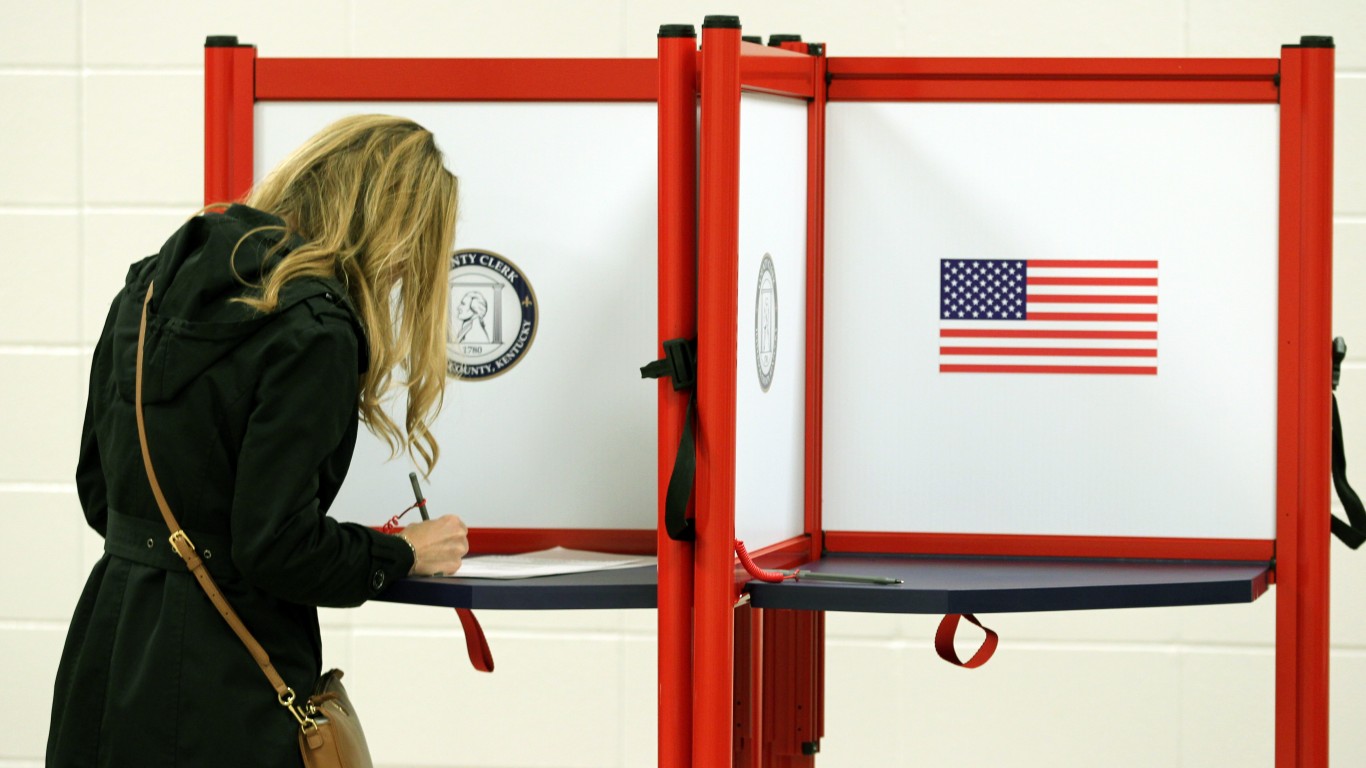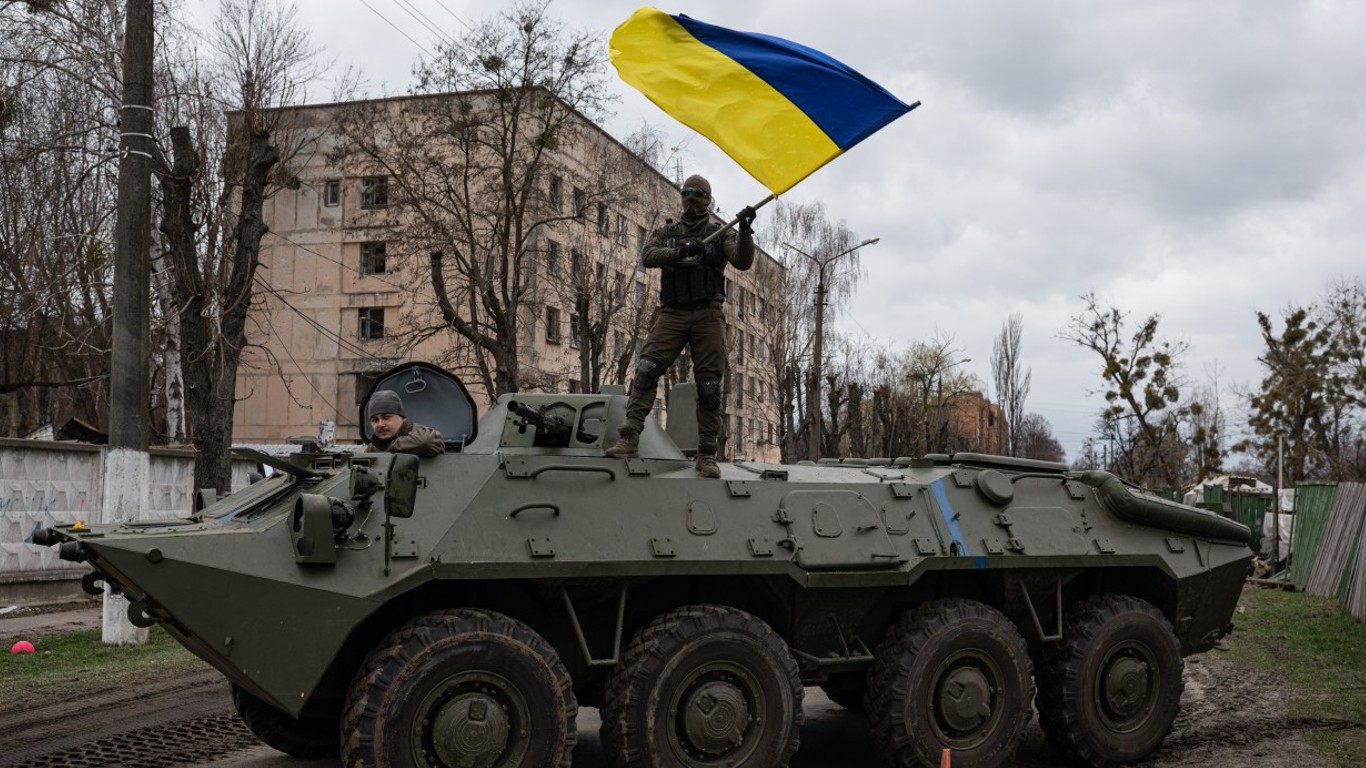
Russia’s invasion of Ukraine and the subsequent war, now in its second year, remains subject to widespread international condemnation. In a recent U.N. General Assembly meeting, 141 countries voted in favor of a resolution calling for an end to the conflict and Russia’s immediate withdrawal from Ukrainian territory. Meanwhile, only seven countries, including Russia, voted against the resolution, and 32 countries abstained.
Though the U.N. resolution is nonbinding, many countries – particularly NATO and EU member states – have taken more decisive action to influence the war’s outcome, sending billions of dollars in humanitarian and military aid to Ukraine and imposing sanctions on Russia to isolate it from the international community.
But as the war drags on with no end in sight, public support for the Ukrainian resistance is being tested. Not only have the sanctions have had a smaller impact on Russia than first expected, but they have also fueled an energy crisis in parts of Europe, leading to rising costs, a reduced standard of living, and stagnant economic growth. Amid the disruption to international trade, several countries are spending billions of taxpayer dollars to prop up Ukrainian military capabilities. The war’s economic toll in much of the world is creating fault lines, both within and among some Ukrainian allies, a development Russian President Vladimir Putin hopes to exploit.
In the United States, political differences over the war are on full display in the field of Republican presidential hopefuls. Two leading candidates – former President Donald Trump and Florida Gov. Ron DeSantis – believe the U.S. has become too involved in the war. This sentiment is by no means isolated to the U.S. as favorable perceptions of Ukraine are declining in much of the world. (Here is a look at the countries sending the most aid to Ukraine.)
Using data from public opinion research company Morning Consult, 24/7 Wall St. identified the countries souring on Ukraine. Countries are ranked based on the decline in net favorability since the start of the war compared to today – that is, the share of the public with favorable views towards Ukraine minus the share with unfavorable views in the period March 1 through April 30, 2022 (immediately after the Russian invasion) compared to net favorability in the period of Jan. 1 through Feb. 15, 2023.
Among the 25 countries on this list, Ukraine’s net-favorability has fallen anywhere from 9 to 29 percentage points. The countries with the largest declines include those for which the war has taken a profound economic toll, and one country that has absorbed well over a million Ukrainian refugees. (Here is a look at the seven countries where the most Ukrainian refugees are fleeing to.)
While favorable views of Ukraine have eroded over the past year in each of these countries, many still have an overwhelming positive view of the embattled country. In Australia and Canada, as well as two European countries, the share of adults with a positive view of Ukraine exceeds the share of those with unfavorable views by 40 or more percentage points.
Conversely, several countries on this list, spanning Asia, Europe, and South America, have gone from having overly positive views towards Ukraine to mostly negative views. China and Belgium are the only two countries on this list that had mostly unfavorable views of Ukraine at the outset of the war.
Click here to see the countries souring on Ukraine.

25. Belgium
> Decline in net favorability of Ukraine, 2022 to 2023: -9 ppts.
> Net favorability of Ukraine, 2023: -13 ppts.
> Net favorability of Ukraine, 2022: -4 ppts.
Despite its status as a founding member of the North Atlantic Treaty Organization, Belgians had an unfavorable view of Ukraine since the start of the war, and sympathetic views of the country have eroded in the year since. The share of adults in Belgium with an unfavorable view of Ukraine in early 2022 was 4 percentage points higher than the share of those with a favorable view, and now those with a favorable view are outnumbered by 13 percentage points.
Since the beginning of the war, Belgium has supplied Ukraine with about $95 million in assault rifles, machine guns, rocket launchers, anti-tank grenade launchers and anti-tank missiles – though it has stopped short of offering tanks, a step other NATO allies have recently taken.
[in-text-ad]
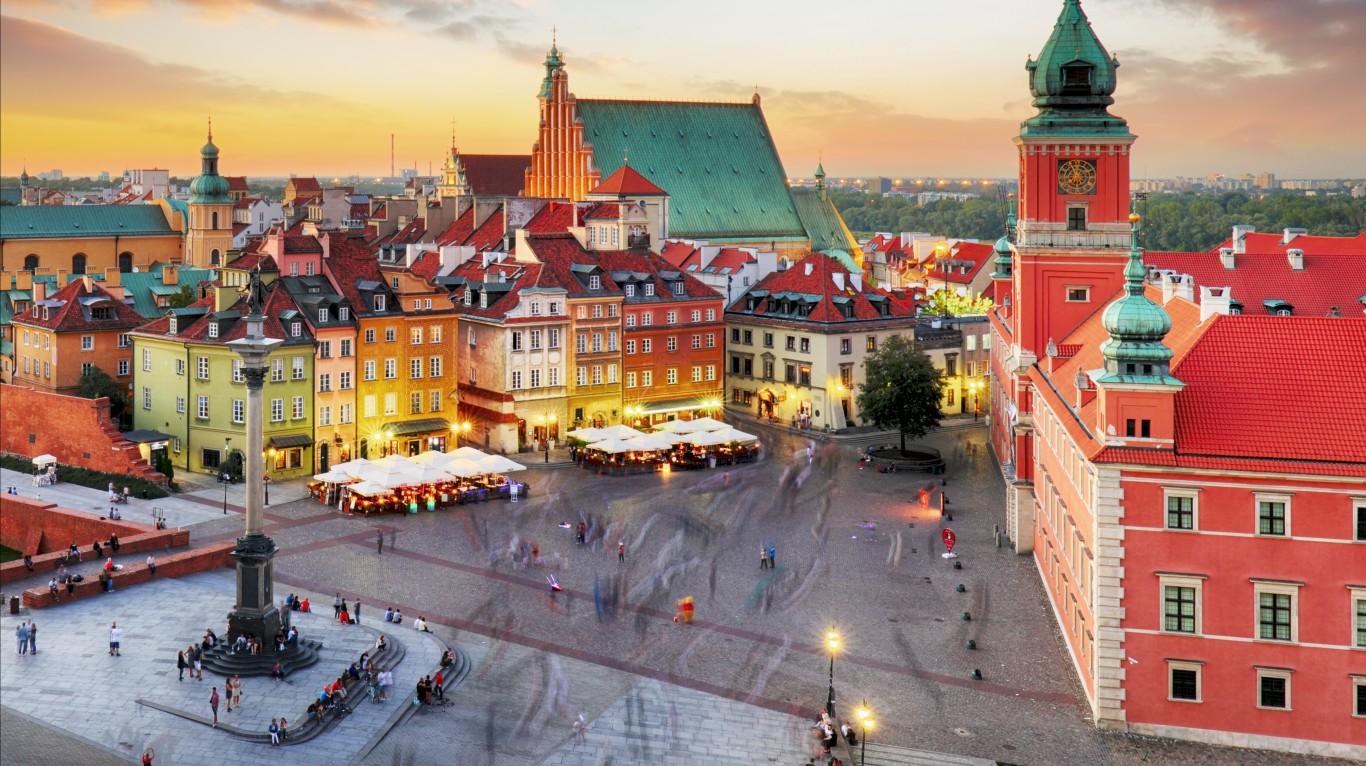
24. Poland
> Decline in net favorability of Ukraine, 2022 to 2023: -9 ppts.
> Net favorability of Ukraine, 2023: +57 ppts.
> Net favorability of Ukraine, 2022: +66 ppts.
The share of adults in Poland with a favorable view of Ukraine is high by global standards. Though net favorable perceptions of Ukraine have slipped by 9 percentage points in Poland after the first year of conflict, the share of Poles with a favorable view of Ukraine is 57 percentage points higher than the share of those with an unfavorable view, the most of any country on this list.
Sharing a border with the Russian province of Kaliningrad, Poland joined NATO in 1999. Poland has been a leader in Europe in both its diplomatic efforts and pledges of aid to Ukraine. Behind the scenes, Poland pushed Germany to send tanks to Ukraine, and Poland itself has given over $3 billion in financial, humanitarian, and military aid since the war began. The country has also been hosting 1.5 million Ukrainian refugees, according to the U.N.

23. Vietnam
> Decline in net favorability of Ukraine, 2022 to 2023: -9 ppts.
> Net favorability of Ukraine, 2023: +7 ppts.
> Net favorability of Ukraine, 2022: +16 ppts.
At the beginning of Russia’s invasion, the share of adults in Vietnam with a favorable opinion of Ukraine outnumbered those with an unfavorable view by 16 percentage points. Now, that number has slipped to 7 percentage points.
Despite the mostly favorable sentiments towards Ukraine, the country has not taken measures to condemn Russia’s invasion. Though Vietnam is a strategic partner of the U.S., it also has ties to Russia that date back to the Vietnam War, when the Soviet Union supported the Southeast Asian nation with military aid, including 7,600 advanced surface-to-air missiles.

22. Brazil
> Decline in net favorability of Ukraine, 2022 to 2023: -9 ppts.
> Net favorability of Ukraine, 2023: 0 ppts.
> Net favorability of Ukraine, 2022: +9 ppts.
Though the share of adults in Brazil with a favorable view of Ukraine was higher than the share of those with an unfavorable view by 9 percentage points at the beginning of the war, Ukraine’s favorability in Brazil is now evenly split.
At a recent press conference with German Chancellor Olaf Scholz, Brazilian President Luiz Inacio Lula da Silva said that Russia was wrong to invade Ukraine, but also assigned blame to Ukraine for not seeking a peaceful solution. Brazil refused to provide military aid to Ukraine or sanction Moscow – an action that has allowed the country to acquire fertilizers for its agricultural sector from Russia.
[in-text-ad-2]

21. Australia
> Decline in net favorability of Ukraine, 2022 to 2023: -10 ppts.
> Net favorability of Ukraine, 2023: +40 ppts.
> Net favorability of Ukraine, 2022: +50 ppts.
Net favorable views of Ukraine have fallen by 10 percentage points in Australia since the start of the war. Still, the share of adults in the country with a favorable view of Ukraine is 40 percentage points higher than the share of those with an unfavorable view – one of the largest net favorability gaps on this list.
As of late October 2022, Australia had provided $655 million in military and humanitarian support for Ukraine. More recently, the country pledged delivery of an unspecified number of drones to Ukraine. Australia has also sanctioned Russian oligarchs, Russian military and energy companies, and has banned certain exports to Russia.

20. Thailand
> Decline in net favorability of Ukraine, 2022 to 2023: -10 ppts.
> Net favorability of Ukraine, 2023: +17 ppts.
> Net favorability of Ukraine, 2022: +27 ppts.
Along with Australia, Thailand is one of two countries where net favorable views of Ukraine have fallen by 10 percentage points since the start of the war. But Ukraine’s 17 percentage point margin of favorability in Thailand is higher than in most other countries on this list.
Though Thailand abstained from a U.N. vote to condemn Russia’s invasion, it recently reversed course, signing on to a U.N. resolution demanding Russia’s immediate withdrawal from Ukraine. In the early months of the war, Bangkok sent 71,000 items of food, blankets, sleeping bags, baby and child products, hygiene items, and first aid kits to support Ukraine.
[in-text-ad]

19. China
> Decline in net favorability of Ukraine, 2022 to 2023: -11 ppts.
> Net favorability of Ukraine, 2023: -33 ppts.
> Net favorability of Ukraine, 2022: -22 ppts.
China does not have an overly positive view of Ukraine, and those views have become more unfavorable over the past year. The share of adults with a negative view of Ukraine is 33 percentage points higher than the share of those with a positive view, an 11 point decline in net favorability since the early months of the war.
Though the Chinese government recently released a 12 point position paper on its views of the war, which among other platitudes, called for ceasing hostilities and resuming peace talks, experts are concerned China may soon start providing military aid to Russia. In February 2022, the month the war started, Chinese President Xi Jinping and Vladimir Putin announced a “friendship without limits” with “no forbidden areas” of cooperation.

18. United Kingdom
> Decline in net favorability of Ukraine, 2022 to 2023: -12 ppts.
> Net favorability of Ukraine, 2023: +47 ppts.
> Net favorability of Ukraine, 2022: +59 ppts.
With the exception of Poland, the United Kingdom has the most positive view of Ukraine of any country on this list. Though Ukraine’s net favorability has slipped by 12 points in the U.K since the start of the war, the share of British adults with a positive view of Ukraine exceeds the share of those with a negative view by 47 percentage points.
A founding member of NATO, the U.K. has taken a hard line stance against Russia, implementing sanctions against Moscow, as well as Russian banks, media, airlines, oligarchs, generals, and commodities – including oil. These sanctions are taking a toll at home, as the U.K. is fighting to contain surging inflation and rapidly falling standards of living. The U.K. also provided Ukraine with $2.8 billion in military aid – a figure it has pledged to match again in 2023.

17. Canada
> Decline in net favorability of Ukraine, 2022 to 2023: -13 ppts.
> Net favorability of Ukraine, 2023: +40 ppts.
> Net favorability of Ukraine, 2022: +53 ppts.
The net favorability of Ukraine among Canadian adults fell by 13 percentage points in the past year. Despite the decline, Canadian views of Ukraine remain overwhelmingly positive, with a 40 point margin over the share of adults in Canada who view Ukraine negatively.
Since the start of the war, Canada has pledged over $1 billion in military aid to Ukraine, including four Leopard 2 main battle tanks. Canadian Prime Minister Justin Trudeau has stated his commitment to remaining a Ukrainian ally for “as long as it takes.” A founding member of NATO, Canada has also taken a hard line against Moscow, imposing sanctions on Russian commodities, luxury goods, defense contractors, oligarchs, ships, and airlines.
[in-text-ad-2]

16. Pakistan
> Decline in net favorability of Ukraine, 2022 to 2023: -13 ppts.
> Net favorability of Ukraine, 2023: +21 ppts.
> Net favorability of Ukraine, 2022: +34 ppts.
The share of adults in Pakistan with a favorable view of Ukraine is 21 percentage points higher than the share of those with an unfavorable view, down from 34 percentage points in the early months of the war.
Early in the war, Pakistan vowed neutrality, as both Russia and Ukraine are key trading partners. In keeping with that pledge, Pakistan was one of 32 countries that abstained from voting in the February 2023 U.N. resolution condemning the Russian invasion. However, in exchange for financial aid and loans, Pakistan recently committed to supplying Ukraine with 159 containers of ammunition, including artillery shells, primers, and fuses.
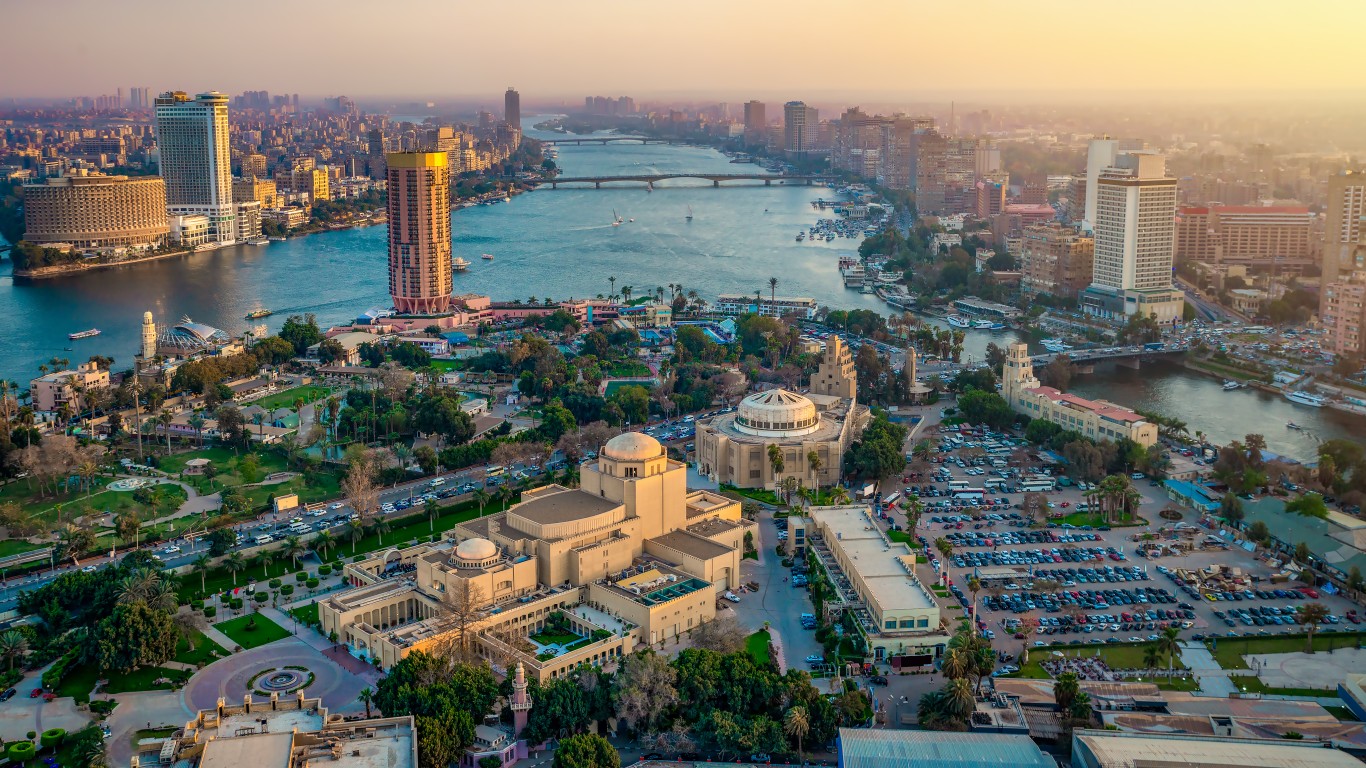
15. Egypt
> Decline in net favorability of Ukraine, 2022 to 2023: -14 ppts.
> Net favorability of Ukraine, 2023: +9 ppts.
> Net favorability of Ukraine, 2022: +23 ppts.
Along with Saudi Arabia, Egypt is one of two countries where favorable views of Ukraine have fallen by 14 percentage points since the start of the war. Currently, the share of adults in Egypt with a favorable view of Ukraine exceeds the share with an unfavorable view by 9 percentage points.
Egypt is the world’s largest importer of wheat, much of which it buys from both Russia and Ukraine. Further complicating matters, Egypt receives significant aid from the West – but Egyptian President Abdel Fattah el-Sisi has had the support of Putin since 2013, the year before he took office. Though initially reluctant to take sides, Egypt has since voted, in more than one U.N. resolution, to condemn the Russian invasion and call for the immediate withdrawal of Russian troops from Ukrainian territory.
[in-text-ad]

14. Saudi Arabia
> Decline in net favorability of Ukraine, 2022 to 2023: -14 ppts.
> Net favorability of Ukraine, 2023: +1 ppts.
> Net favorability of Ukraine, 2022: +15 ppts.
Ukraine’s net favorability has dropped by 14 percentage points in Saudi Arabia since the start of the war. Now, Saudis with a favorable view of Ukraine outnumber those with an unfavorable view by a slim 1 percentage point margin, down from a net-positive 15 points in the early months of the war.
Though the Saudi government is under pressure from the West to take sides against Moscow, Saudi Arabia has so far largely resisted, seeing the war as a regional, European problem rather than a global one. At the start of the war, as the U.S. and NATO allies were imposing strict sanctions on Russian businesses and commodities, the Saudi conglomerate Kingdom Holding Company invested $500 million in three Russian oil companies. A key OPEC member state, Saudi Arabia also conspired with Russia to cut oil production in October 2022. Notably, however, Saudi Arabia also voted in a recent U.N. resolution to condemn the invasion of Ukraine.

13. Spain
> Decline in net favorability of Ukraine, 2022 to 2023: -15 ppts.
> Net favorability of Ukraine, 2023: +9 ppts.
> Net favorability of Ukraine, 2022: +24 ppts.
The share of adults in Spain with a favorable view of Ukraine is 9 percentage points higher than the share of those with an unfavorable view, down from a net 24 percentage point favorability rating in the early months of the war.
Spanish Prime Minister Pedro Sánchez has visited Ukraine twice since the start of the war and has pledged to support Ukraine in its resistance to the invasion for as long as is necessary. A NATO member since 1982, Spain has agreed to send six Leopard tanks to Ukraine and with the potential to send an additional four tanks and possibly fighter jets.
While favorable views of Ukraine have declined in recent months, unfavorable views of the government in Moscow have surged. According to a recent poll conducted by the Pew Research Center, 94% of adults in Spain had no confidence in Putin to do the right thing regarding world affairs in 2022, up from 57% in 2021.

12. South Korea
> Decline in net favorability of Ukraine, 2022 to 2023: -16 ppts.
> Net favorability of Ukraine, 2023: +17 ppts.
> Net favorability of Ukraine, 2022: +33 ppts.
The share of adults in South Korea with a favorable view of Ukraine exceeds the share of those with an unfavorable view by 17 percentage points, down 16 points from the early months of the war.
Early in the war, South Korea imposed sanctions on Russian defense contractors, banks, and other companies. As of the end of 2022, South Korea had also provided $40 million in humanitarian aid to support Ukrainians and Ukrainian refugees.
Still, though the South Korean military is heavily backed by the U.S., the country has yet to heed calls from NATO to provide much needed military aid. Rather than donating munitions, South Korea sold 100,000 artillery rounds to the U.S. in November 2022, which ultimately went to Ukraine. Notably, South Korean officials maintain the arms deal was only intended to replenish depleting U.S. ammunition stocks.
[in-text-ad-2]

11. Argentina
> Decline in net favorability of Ukraine, 2022 to 2023: -17 ppts.
> Net favorability of Ukraine, 2023: -6 ppts.
> Net favorability of Ukraine, 2022: +11 ppts.
Argentina is one of two South American countries where views of Ukraine have flipped from mostly positive to negative since the start of the war. The share of adults in Argentina with an unfavorable view of Ukraine exceeds the share of those with an unfavorable view by 6 percentage points, while at the beginning of the war, the country had an 11 point net-favorable view of Ukraine.
The Argentinian government voted to condemn the Russian invasion of Ukraine in a February 2023 U.N. resolution and repeatedly called for peace talks and a permanent end to the conflict. Beyond rhetoric, however, the country has done little, refusing to impose sanctions or military aid to Ukraine. The war is also contributing to an ongoing inflation crisis in Argentina, particularly impacting the price of food, fertilizer, and energy.

10. France
> Decline in net favorability of Ukraine, 2022 to 2023: -19 ppts.
> Net favorability of Ukraine, 2023: -8 ppts.
> Net favorability of Ukraine, 2022: +11 ppts.
In the year since Russia’s invasion began, French views of Ukraine have flipped from mostly positive to negative. The share of adults in France with an unfavorable view of Ukraine exceeds the share of those with an unfavorable view by 8 percentage points, while at the beginning of the war, the country had an 11 point net-favorable view of Ukraine. The 19 percentage point shift is among the largest declines in the world.
France has provided Ukraine with material and other military aid valued at over half a billion dollars. Additionally, along with other EU member states, France has imposed sanctions on Russian oligarchs and has independently imposed further sanctions on Russian defense contractors.
However, like many European countries, France is fighting to contain surging inflation and stagnating GDP growth, largely due to the economic consequences of the war and EU sanctions.
[in-text-ad]
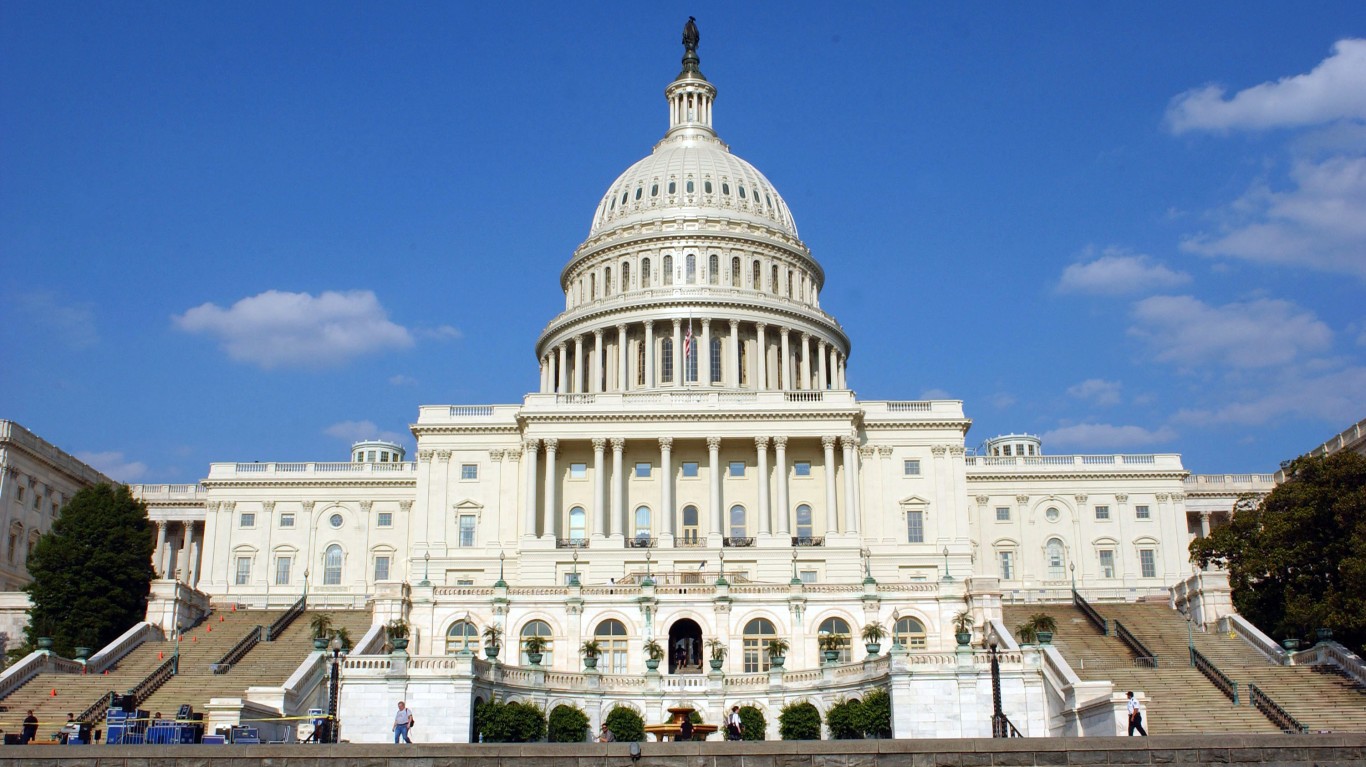
9. United States
> Decline in net favorability of Ukraine, 2022 to 2023: -19 ppts.
> Net favorability of Ukraine, 2023: +32 ppts.
> Net favorability of Ukraine, 2022: +51 ppts.
Ukraine’s net favorability in the United States has fallen by 19 percentage points since the start of the war. Still, Americans have a generally positive view of the country. The share of adults with a favorable view of Ukraine is 32 percentage points higher than the share of those with a negative view.
The U.S. has been, far and away, the largest contributor of aid to Ukraine, with Congress appropriating more than $112 billion in military and humanitarian assistance in 2022 alone. Ukraine’s declining favorability in the United States is on full display in the field of Republican presidential hopefuls. Two leading candidates – former President Donald Trump and Florida Gov. Ron DeSantis – believe the U.S. has become too involved in the war in Ukraine.

8. Chile
> Decline in net favorability of Ukraine, 2022 to 2023: -19 ppts.
> Net favorability of Ukraine, 2023: -8 ppts.
> Net favorability of Ukraine, 2022: +11 ppts.
Chile is one of two Latin American countries where views of Ukraine have flipped from mostly positive to negative since the start of the war. The share of adults in Chile with an unfavorable view of Ukraine exceeds the share of those with an unfavorable view by 8 percentage points, while at the beginning of the war, the country had an 11 point net-favorable view of Ukraine.
Rhetorically, Chile has condemned Russia’s invasion of its neighbor. But in the past year, Chile has been hit hard by rising oil and gas prices that are a direct result of the war.

7. Japan
> Decline in net favorability of Ukraine, 2022 to 2023: -21 ppts.
> Net favorability of Ukraine, 2023: -1 ppts.
> Net favorability of Ukraine, 2022: +20 ppts.
Ukraine’s net favorability has dropped by 21 percentage points in Japan since the start of the war. Now, adults in Japan with a favorable view of Ukraine outnumber those with an unfavorable view by a slim 1 percentage point margin, down from a net-positive 20 points in the early months of the war.
Since the start of the war, Japan has imposed a flurry of sanctions on Moscow, Russian oligarchs, defense contractors, banks, and commodities. And while favorable views of Ukraine have declined in Japan in recent months, unfavorable views of the government in Moscow have surged. According to a recent poll conducted by the Pew Research Center, 92%of adults in Japan had no confidence in Putin to do the right thing regarding world affairs in 2022, up from 57% in 2021.
[in-text-ad-2]
6. Israel
> Decline in net favorability of Ukraine, 2022 to 2023: -22 ppts.
> Net favorability of Ukraine, 2023: +1 ppts.
> Net favorability of Ukraine, 2022: +23 ppts.
Ukraine’s net favorability among Israeli adults has fallen by 22 percentage points since the start of the war, one of the largest such declines of any country. As a result, the share of adults in Israel with favorable views of Ukraine is now roughly equal to the share of adults with unfavorable views.
Though the Israeli government has condemned Russian aggression in Ukraine, officials are concerned that support for Ukraine could jeopardize its relationship with Russia regarding interests in the Middle East – specifically Russia’s allowing Israel to conduct military operations in Syria, an ability Israel sees as crucial to its continued existence. Though Israel has refused to offer lethal military assistance to the Ukrainian resistance, it has sent defensive aid, including bullet-proof ambulances, 3,500 helmets, 2,000 protective vests, 1,000 gas masks, hundreds of mine protection suits, and dozens of hazmat filtration systems.
5. Italy
> Decline in net favorability of Ukraine, 2022 to 2023: -23 ppts.
> Net favorability of Ukraine, 2023: +12 ppts.
> Net favorability of Ukraine, 2022: +35 ppts.
The share of adults in Italy with favorable views of Ukraine is higher than the share of those with unfavorable views by 12 percentage points, down from a net positive 35 percentage points in the early months of the Russian invasion.
A founding NATO member, Italy has imposed sanctions on Russian oligarchs and defense contractors, and though Italy has divulged little regarding its level of military support for Ukraine, the country has reportedly sent stinger missiles, mortars, anti-tank weapons, rocket launch systems, howitzers, as well as both light and heavy machine guns. And despite concerns among some NATO allies, Italy’s new right-wing government, under Prime Minister Giorgia Meloni, has pledged to maintain military support at least through 2023, or until peace negotiations begin.
[in-text-ad]

4. Switzerland
> Decline in net favorability of Ukraine, 2022 to 2023: -24 ppts.
> Net favorability of Ukraine, 2023: -5 ppts.
> Net favorability of Ukraine, 2022: +19 ppts.
In the year since Russia’s invasion began, Swiss views of Ukraine have flipped from mostly positive to negative. The share of adults in Switzerland with an unfavorable view of Ukraine exceeds the share of those with an unfavorable view by 5 percentage points, while at the beginning of the war, the country had a 19 point net-favorable view of Ukraine. The 24 percentage point swing is among the largest declines in the world.
Since the beginning of the invasion, Switzerland has sanctioned the Russian central bank as well as other financial institutions, oligarchs, companies, defense contractors, and oil. In November 2022, with winter looming, Switzerland promised $100 million in humanitarian aid to Ukraine. However, because Switzerland has a long-standing policy of military neutrality, it has not sent military aid and has even refused to allow Germany and other European countries to send much-needed Swiss-made air defense ammunition.

3. Ireland
> Decline in net favorability of Ukraine, 2022 to 2023: -26 ppts.
> Net favorability of Ukraine, 2023: +35 ppts.
> Net favorability of Ukraine, 2022: +61 ppts.
Despite declining by 26 percentage points, Ukraine’s net favorability among the Irish population remains largely positive, as the share of adults in Ireland with a favorable view of Ukraine is 35 percentage points greater than the share of those with a negative view.
Ireland has pledged nearly $80 million in humanitarian aid for Ukraine and neighboring countries in 2023 and, as an EU member state, has multilaterally imposed sanctions on Russian banks, oligarchs, lawmakers, airlines, media, ships, and defense contractors. However, as is the case in much of the eurozone, energy shocks stemming from the war sent inflation soaring in Ireland in 2022.
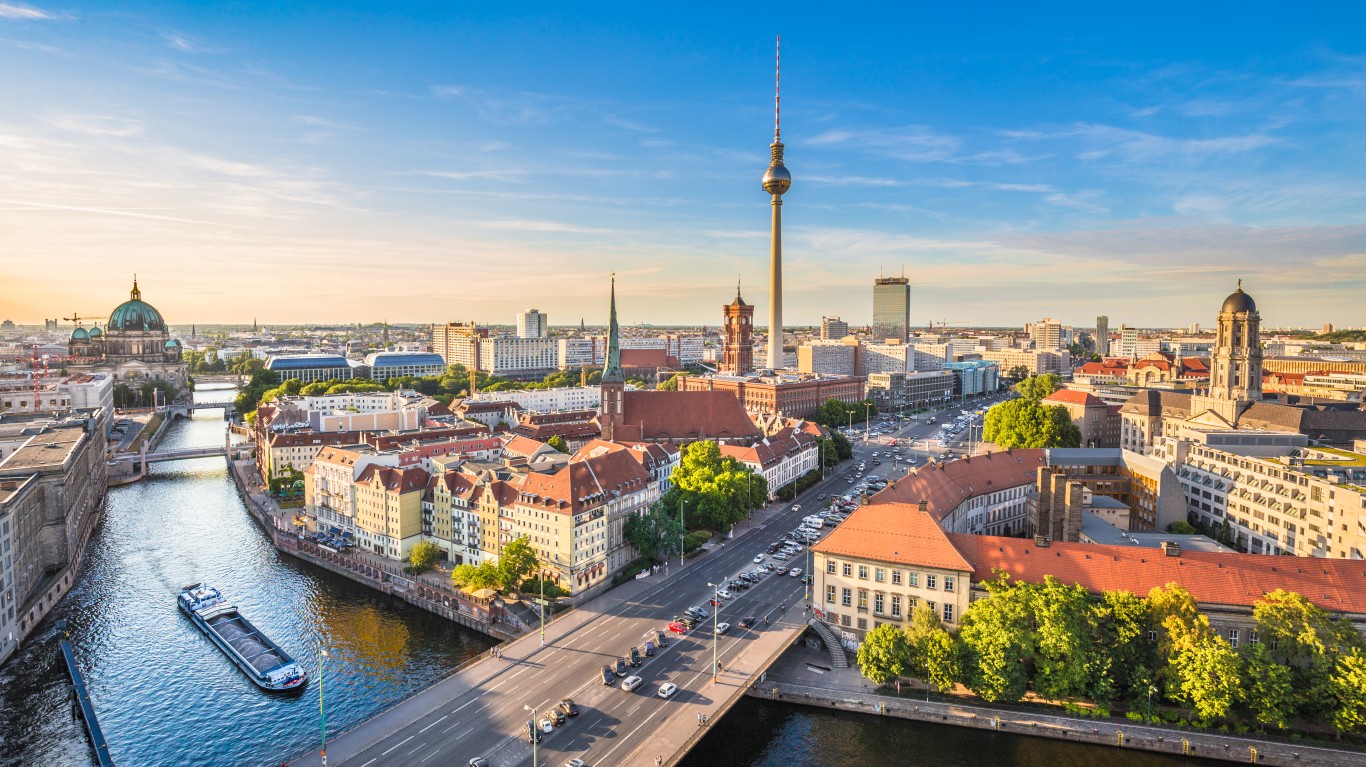
2. Germany
> Decline in net favorability of Ukraine, 2022 to 2023: -28 ppts.
> Net favorability of Ukraine, 2023: -4 ppts.
> Net favorability of Ukraine, 2022: +24 ppts.
Favorable opinions of Ukraine have fallen sharply in Germany in the past year. The share of adults in Germany with an unfavorable view of Ukraine is 4 percentage points higher than the share of those with an unfavorable view, while at the beginning of the war, the country had an 24 point net-favorable view of Ukraine.
Germany is one of the staunchest supporters of Ukraine in its resistance to the Russian invasion, providing about $5.8 billion in military and humanitarian aid in 2022, and another $7.6 billion to EU initiatives to help Ukraine. Aside from Russia and Ukraine, Germany has also suffered some of the most severe economic consequences from the war.
Since the end of the Cold War, the German and Russian economies became closely linked, with Germany relying on Russian oil and gas. Germany severed those ties at the onset of the war, however, resulting in a domestic energy crisis. The war has cost the German economy $107 billion by some estimates, leading to GDP contraction in the fourth quarter of last year, and putting the country on the brink of a recession.
[in-text-ad-2]
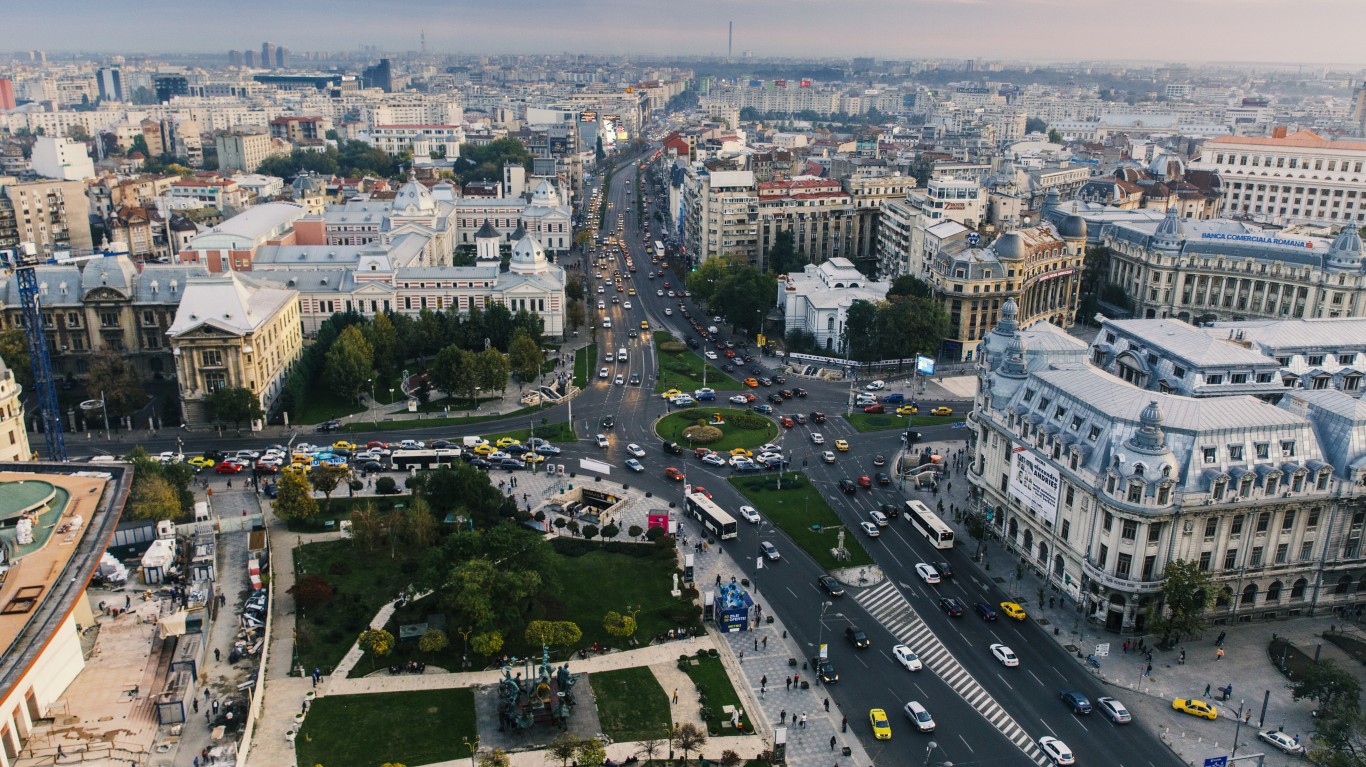
1. Romania
> Decline in net favorability of Ukraine, 2022 to 2023: -29 ppts.
> Net favorability of Ukraine, 2023: +4 ppts.
> Net favorability of Ukraine, 2022: +33 ppts.
Romania has had the largest decline in net favorable views toward Ukraine of any of the 43 countries surveyed by Morning Consult. The share of adults in Romania with a favorable view of Ukraine is 4 percentage points higher than the share of those with an unfavorable view, down from 33 percentage points in the early months of the war.
Sharing a 373-mile border with Ukraine, Romania has absorbed more than 1.8 million Ukrainian refugees since the start of the conflict, according to ACAPS, a nonprofit humanitarian organization. A NATO member since 2004 and a member of the EU since 2007, Romania’s economy is not closely linked with that of Russia, and the country has helped Ukraine export grain via the Black Sea.
As an EU member state, Romania has multilaterally imposed sanctions on Russian banks, oligarchs, lawmakers, airlines, media, ships, and defense contractors.
100 Million Americans Are Missing This Crucial Retirement Tool
The thought of burdening your family with a financial disaster is most Americans’ nightmare. However, recent studies show that over 100 million Americans still don’t have proper life insurance in the event they pass away.
Life insurance can bring peace of mind – ensuring your loved ones are safeguarded against unforeseen expenses and debts. With premiums often lower than expected and a variety of plans tailored to different life stages and health conditions, securing a policy is more accessible than ever.
A quick, no-obligation quote can provide valuable insight into what’s available and what might best suit your family’s needs. Life insurance is a simple step you can take today to help secure peace of mind for your loved ones tomorrow.
Click here to learn how to get a quote in just a few minutes.
Thank you for reading! Have some feedback for us?
Contact the 24/7 Wall St. editorial team.
 24/7 Wall St.
24/7 Wall St.


